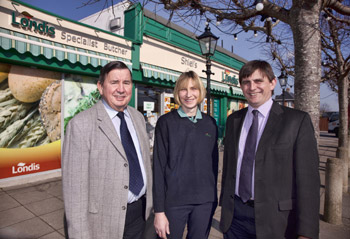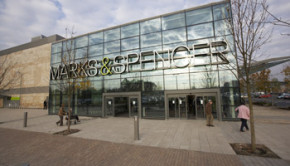By retailers, for retailers

John Shiel’s grandfather and father both sat on the board of ADM Londis. As he tells GILLIAN HAMILL, the retailer-focused ethos behind the company’s creation is still central today.
18 March 2010
Sheil’s Londis
Yellow Walls Road, Malahide, Co. Dublin
Owner John Sheil
Size 5,000 sq ft
Staff 50: 35 full-time,15 part-time
Retail “is almost in the blood,” says John Shiel jovially, as he describes how packing shelves and moping floors as a teenager was “part and parcel of his induction into the business.” As a fourth generation grocer, the trade certainly is in his blood at any rate. Shiel’s grandfather was a founding member of the ADM Londis board, of which he himself is now a retail director and vice chairman.
“The history of ADM Londis stems from being founded by retailers for retailers,” he explains. “It was set up at a time when independents had to compete very, very strongly with multiples, and couldn’t buy on the same scale. That was the founding origins of ADM, and that ethos still exists today.
Although ADM Londis is now a Plc as opposed to a co-operative, it’s “a company that’s still owned by retailers. There’s a lot of retailer input at the board level and a lot of the decisions are taken with retailers in mind. Our programme comes directly from the shopfloor and what’s happening out there.”
Long-term gains
A strong advantage for Londis’ retail partners, adds Shiel, is that this approach allows long-term thinking to take precedence over the drive to create immediate gains for eager shareholders. “The wonderful thing about being a retailer owned company is you can actually take decisions that don’t necessarily have to produce a return immediately; ADM take a three to five year perspective on it. In other companies, shareholders will drive business for a return on investment immediately, whereas we have the luxury of being able to decide where we need to go.”
This retailer-focused direction has seen ADM Londis significantly extend its warehouse in Johnstown, Naas, Co Kildare, and consolidate the business through locating its customer support function there also. Since the start of this year, Londis has also been trialling a chilled distribution model, for which the “initial reports are very positive…This is an important offering because chilled distribution is an area which is going to change significantly in the next five to 10 years,” adds Shiel.
Londis’ strategic alliance with Nisa-Today’s has also delivered significant advantages for the group, not least in that it now benefits from a €6 billion buying power, and an extensive private label offering. And in Shiel’s view, the current offering on Londis shelves represents “the strongest value offering that I’ve seen in 20 years. He notes that Londis listings currently offer six pages of special price promotion offerings, which simply wouldn’t have been seen six years ago.
The retailer’s price is right
While offering value is crucial in the current market however, Shiel maintains retailers should be able to set their own prices according to what’s right for their own particular business model. “With some of the [symbol] groups out there at the moment, retailers are being told what to buy at and told what to sell at. There’s very little cognisance being taken of the cost base that each of those retailers have and whether that model is actually suitable for them. So I would say there’s a feeling of a loss of ownership within a lot of other groups.”
Londis has a recommended pricing list and a recommended margin, but each retailer is allowed to set his own margin and his own pricing within that. It wouldn’t be very reasonable to expect someone who has a very low rental expense in the west of Ireland, to charge the same retail prices as Grafton Street or Henry Street where the rent could be many times that.”
Retailers should also be allowed a degree of flexibility in where they choose to source goods, he adds. “Sometimes the benefits that you get from buying small and locally, are what gets lost in upscaling an operation. I think buying locally with smaller producers is fantastic; there’s a lovely offering out there.”
Local heroes
To demonstrate this point, he shows ShelfLife a new product “just in this morning” from The Cupcake Store in Malahide. The company has capitalised on the trend for in-vogue cupcakes by producing six cakes in a quaint yet stylish box. “The presentation is fantastic and that’s the type of thing we’re getting coming from a local level. We even have a lady who’s been making homemade jams for us for about 25 years. It’s the most magnificent jam you’ll ever taste and the labels are handwritten in Irish – you’d have to go back a long time to get that type of dedication to quality.”
In his view, local retailers occupy a key role in the Irish food chain by helping start-ups get their business off the ground. “This is what keeps our food business up and going. Cashel Blue wouldn’t be Cashel Blue today unless some of the retailers who were smaller had taken a little bit of time and care to actually support them in the nursery stage; otherwise it would never have got to market.”
And “quality is at the top of our agenda” according to Shiel. “Getting your fresh food offering right is critical. We would spend a lot of time in each department, such as our deli and off-licence departments, to see where we can distinguish ourselves from the multiples. Along with personal service and a reasonable price, that would be the key driver as to what we’re about.”
Award winning off-licence
As a finalist in the NOffLA off-licence of the year award 2010 – Shiel’s off-licence department which features over 800 wines – from €4.99 right up to the €350 and €400 mark, definitely does stand out. It’s crucial to Shiel that he and his staff are able to advise customers properly. Both he and another staff member Niamh, therefore have a diploma from the Wine Development Board, while another two staff members are trained to certificate standard.
This development was all part of his retailing learning curve; he reveals that he was first inspired to boost his wine knowledge after a customer asked some particularly tricky questions. “I said right, that’s the first and last time somebody asks me a question, who has more knowledge about the product that I’m selling than I actually have, and I set about fixing that.” Shiel’s Londis has grown up alongside the Malahide area. When his father Frank first set up shop and moved there from Terenure 37 years ago, John Shiel was just 12 years old. Malahide only had some 85 houses, which subsequently grew rapidly to a population of 23,000 today. After college, John Shiel worked in Saudi Arabia for several years for the dairy company Mastock, before returning to Ireland in 1985 and taking over the shop reins alongside his sister Rufina.
Surviving a previous recession within the grocery trade, has subsequently given him a more realistic perspective. “I look at this downturn and we’re still relatively well off compared to where we were in 2003, 2004, and 2005. If you’d asked retailers in 2005 how they’d felt about their business, most of them would have said pretty good. So I think we have to take things from that perspective. It’s never ever going to be a constant rising market…there’s going to be times when the market changes and there’ll be different competitors…That’s part of what makes grocery an attractive business to be in. And that’s where ADM comes in, because it’s important to have good support.”



 Print
Print





Fans 0
Followers